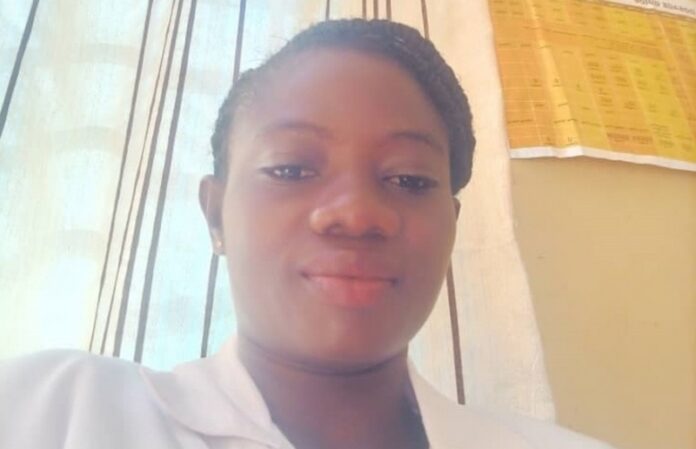Sorrow has engulfed the Edwenase community following the suspected death by suicide of Akosua Adutwuwaa, a 37-year-old nurse stationed at the Kokofu Government Hospital.
Her lifeless body was discovered hanging from a ceiling fan in her home on Sunday morning, leaving family, friends, and colleagues in shock and grief.
The grim discovery sent shockwaves through the quiet residential area, prompting a swift police response.
According to her distraught mother, Akosua’s day had begun seemingly as usual.
She reportedly attended to household chores and meticulously prepared breakfast for her two-year-old daughter.
However, as the family made preparations to depart for church, Akosua was nowhere to be found.
A frantic search ensued, culminating in the heartbreaking discovery in one of the rooms within their home.
The sudden and tragic loss of a healthcare professional dedicated to the well-being of others has cast a sombre mood over the community and the broader health sector.
Investigations are currently underway by local police to ascertain the full circumstances surrounding her death, though initial indications point to suicide.
The body of Akosua Adutwuwaa has been moved to the mortuary for an autopsy.
This heartbreaking incident in Edwenase underscores a silent but persistent public health crisis in Ghana related to the rising, yet often underreported, issue of suicide and the broader challenges of mental health.
For years, suicide remained a criminal offence under Ghanaian law—a factor that significantly contributed to underreporting and deepened the stigma surrounding mental health issues.
While a landmark amendment in March 2023 finally decriminalised suicide, moving it from a criminal act to a mental health issue, the societal stigma and barriers to seeking help remain formidable.
Official statistics on suicide in Ghana are difficult to ascertain due to various factors, including cultural reluctance to report such deaths, fear of social ostracism for affected families, and the lack of a robust national suicide surveillance system.
However, mental health experts and reports from organisations like the World Health Organisation (WHO) consistently highlight that suicide is a global concern, and Ghana is not immune.
It is estimated that a significant portion of the Ghanaian population experiences some form of mental health disorder, but only a fraction receives professional care due to limited resources, few specialised personnel (psychiatrists, clinical psychologists), and concentrated facilities primarily in urban centres.
Factors contributing to mental distress and suicidal ideation in Ghana are complex and multifaceted, often including economic hardship, unemployment, relationship problems, chronic physical illnesses, substance abuse, and undiagnosed or untreated conditions like depression and anxiety.
Healthcare professionals, despite their roles, are not immune to these pressures and may also face unique occupational stressors that can impact their mental well-being.
Mental health advocates and civil society organisations have long campaigned for increased investment in mental healthcare, widespread public awareness campaigns to combat stigma, and improved access to affordable mental health services, particularly at the community level.
The tragic passing of Akosua Adutwuwaa serves as a reminder of the urgent need for a more comprehensive and compassionate approach to mental health in Ghana—ensuring that individuals in distress receive the support and care they need before it is too late.
Source: Myjoyonline.com



